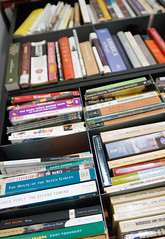 In late 2001 among the people I knew, cellphones went from being a gadget of the technorati to something that everyone had. I was living in a dorm with five roommates at the time and one consequence of the change was that we no longer ever spoke with each other’s parents. Previously parents had called the room line and whoever was around would pick up. I enjoyed shooting the breeze with my friends’ moms (it was mostly moms who called) and I regretted that there was no longer much opportunity to do that once cellphones allowed our parents to call each of us directly.
In late 2001 among the people I knew, cellphones went from being a gadget of the technorati to something that everyone had. I was living in a dorm with five roommates at the time and one consequence of the change was that we no longer ever spoke with each other’s parents. Previously parents had called the room line and whoever was around would pick up. I enjoyed shooting the breeze with my friends’ moms (it was mostly moms who called) and I regretted that there was no longer much opportunity to do that once cellphones allowed our parents to call each of us directly.
Ereaders today feel somewhat like cellphones just before 2001. They are not yet ubiquitous, but they are well past the early-adopter stage and their growth seems poised to go geometric. When the Kindle came out in 2007 I poopooed it as the future face of reading; the hyperactivity of the Internet just seemed like a bad match with the meditative experience of reading a book. But the other day while watching my eight-month-old son knock around a pile of books, I knew suddenly and viscerally that I was wrong. The clunky objects he was playing with seemed like relics.
The Millions has written previously about the externalities of e-readers. Edan has commented on how they portend a drawing down of the public space in which we read—with the Kindle you don’t know what the person next to you is reading, or how far along in it they are, or whether their copy of the book is dog-eared or brand new (because it’s neither).
One of the most prominent losses in this regard stands to be the loss of bookshelves. A chief virtue of digital books is said to be their economical size—they take up no space at all!—but even a megabyte seems bulky compared to what can be conveyed in the few cubic feet of a bookshelf. What other vessel is able to hold with such precision, intricacy, and economy, all the facets of your life: that you bake bread, vacationed in China, fetishize Melville, aspire to read Shakespeare, have coped with loss, and still tote around a copy of The Missing Piece as a totem of your childhood. And what by contrast can a Kindle tell you about yourself or say to those who visit your house? All it offers is blithe reassurance that there is progress in the world, and that you are a part of it.
Of the bookshelves I’ve inspected in my life, two stand out as particularly consequential. The first was my mother’s, which was built into the wall of the bedroom where she grew up. When I would visit my grandparents in the summer I would spend hours inspecting that bookshelf. The books were yellowed and jammed tightly together, as though my mother had known it was time to leave home once she no longer had any room left on her shelves. In the 1960s novels, the Victorian classics, and the freshman year sociology textbooks fossilized on the bookshelf, I got the clearest glimpse I ever had of my mother as a person who existed before me and apart from me, and whose inner life was as bottomless as I knew my own to be.
And then there was my wife, whose bookshelves I first inspected in a humid DC summer, while her parents were away at work. The shelves were stuffed full of novels—Little House on the Prairie, The Andromeda Strain, One Hundred Years of Solitude—that described an arc of discovery I had followed too. At the time we met, her books still quivered from recent use and still radiated traces of the adolescent wonder they’d prompted. In the years since, on visits home for the holidays and to celebrate engagements and births, I’ve watched her bookshelves dim and settle. Lately they’ve begun to resemble a type of monument I recognize from my mother’s room. They sit there waiting for the day when our son will be old enough to spend his own afternoons puzzling out a picture of his mother in the books she left behind.
It remains to be seen how many more generations will have the adventure of getting to know their parents in just this way. One for sure, and maybe two, but not much beyond that I wouldn’t think. To the extent that bookshelves persist, it will be in self-conscious form, as display cases filled with only the books we valued enough to acquire and preserve in hard copy. The more interesting story, however, the open-ended, undirected progression of a life defined by books will surely be lost to a digital world in which there is no such thing as time at all.
[Image source: David Goehring]









